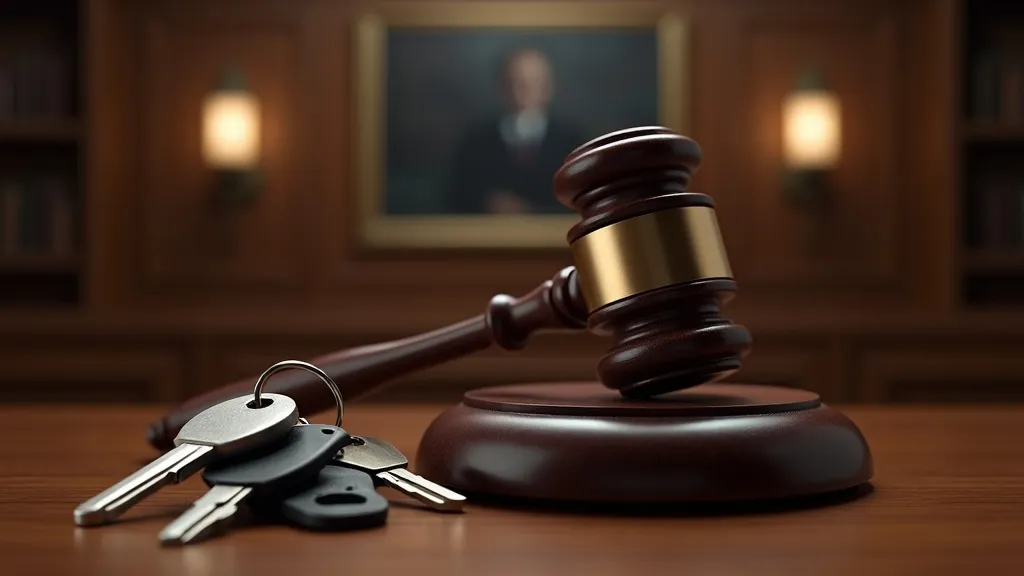Understanding Wrongful Repossession Claims
Wrongful repossession occurs when lenders reclaim property without following legal procedures. This article explores the complexities of wrongful repossession, providing insights into consumer rights, legal processes, and potential remedies for those affected. Repossession disputes often arise from misunderstandings or errors, emphasizing the importance of understanding contractual obligations and legal protections.

Understanding Wrongful Repossession
Wrongful repossession is a term that describes the illegal reclamation of property, such as vehicles or real estate, by lenders or financial institutions. It occurs when the repossession process does not adhere to legal protocols or when a mistake is made, resulting in the seizure of property from individuals who may not be in default. This issue has significant implications for both consumers and lenders, highlighting the need for clarity and compliance with legal standards.
In a world where financial transactions are a common part of life, understanding the nuances of wrongful repossession becomes critical. Many consumers may not realize the extent of their rights or the specific legal protections afforded to them under various laws. As we delve deeper into the topic, it's essential to examine not only the legal framework surrounding repossession but also the psychological and emotional toll it can take on individuals and families.
The Legal Framework of Repossession
Repossession is governed by state and federal laws, which outline specific procedures that must be followed to ensure legality. These laws are designed to protect both the lender's rights to recover assets and the consumer's rights to due process. Essential components of legal repossession include providing timely notice to the borrower, adhering to any state-specific requirements, and ensuring the repossession itself does not breach the peace.
Each state has its own set of rules regarding repossession, which can include the requirement for lenders to send a written notice to consumers before taking action. This notice typically outlines the default, the amount owed, and a deadline for the consumer to remedy the situation. For example, in some states, lenders must provide a grace period where the borrower can make payments before repossession occurs. Understanding these laws is crucial for consumers to protect their rights effectively.
Moreover, the Uniform Commercial Code (UCC) governs secured transactions in the United States, providing a framework for how repossession should occur. The UCC emphasizes the importance of "self-help" in repossession, allowing lenders to recover property without judicial intervention as long as they do so without breaching the peace. This principle, however, can lead to misunderstandings and conflicts if not executed carefully.
Common Causes of Wrongful Repossession
Several factors can lead to wrongful repossession, including clerical errors, miscommunication between the borrower and lender, or failure to follow legal procedures. For instance, if a borrower has made arrangements to make late payments, yet the lender proceeds with repossession, it may be deemed wrongful. Additionally, if a lender repossesses property without proper notice or in a manner that disrupts public peace, it could be challenged legally.
One common scenario involves errors in payment processing. For example, a consumer may have made a payment that was not properly recorded by the lender, leading the lender to believe the account is in default. Similarly, if a borrower disputes a charge or a fee that the lender insists is valid, this can result in wrongful repossession if the lender does not pause to investigate the claim before taking action.
Moreover, technological failures can play a role in wrongful repossession. As many lenders use automated systems to track payments and manage accounts, glitches in these systems can lead to unintended consequences. For instance, if a payment is processed late due to a technical issue, the automated system may trigger a repossession without human oversight, leading to significant distress for the borrower.
Effects on Consumers
Wrongful repossession can have severe consequences for consumers. It can lead to financial strain, loss of essential transportation, and damage to credit scores. Additionally, the emotional and psychological impact of losing valuable assets cannot be understated. Consumers may feel helpless and uncertain about their rights or how to contest the repossession.
When a vehicle is repossessed, it often disrupts the daily lives of the consumers involved. For many individuals, a car is not just a luxury; it’s a necessity for commuting to work, taking children to school, and managing everyday errands. Without reliable transportation, consumers may struggle to maintain employment or fulfill family obligations, resulting in a cascading effect on their financial and personal lives.
Furthermore, the emotional toll of wrongful repossession can lead to increased anxiety, stress, and even depression. Many consumers may experience feelings of shame or embarrassment, leading to social isolation and a reluctance to seek help. The stigma associated with financial problems can exacerbate these feelings, making it essential for support systems to be in place to assist those affected by wrongful repossession.
Legal Remedies and Consumer Rights
Consumers have several legal remedies available if they believe their property has been wrongfully repossessed. These remedies may include filing a lawsuit against the lender, seeking compensation for damages, and possibly reclaiming the repossessed property. It is crucial for consumers to understand their rights under the Fair Debt Collection Practices Act (FDCPA) and any state-specific laws that protect against illegal repossession practices.
The FDCPA outlines specific protections for consumers, including the right to dispute debts, the right to request validation of a debt, and the right to be treated fairly by debt collectors. If a lender violates these rights during the repossession process, the consumer may have grounds for a lawsuit. Additionally, some states have enacted specific laws that provide further protections against wrongful repossession, allowing consumers to pursue claims for emotional distress or punitive damages in severe cases.
Furthermore, consumers may also explore options such as mediation or arbitration as alternatives to litigation. These processes can provide a less adversarial environment for resolving disputes, allowing both parties to negotiate a solution without the need for a lengthy court battle. Mediation can be particularly beneficial in cases where both the consumer and lender wish to maintain a working relationship moving forward.
Steps to Take if You Face Wrongful Repossession
Here is a step-by-step guide for consumers who believe they have been wrongfully repossessed:
- Review Your Contract: Carefully examine your loan agreement to understand your obligations and the lender's rights. Look for any clauses related to default, notice requirements, and procedures for repossession.
- Document Everything: Keep detailed records of all communications with your lender, including phone calls, emails, and letters. Note down the dates, times, and names of individuals you spoke with, as well as the content of the conversations.
- Seek Legal Advice: Consult with an attorney who specializes in consumer protection or repossession laws to evaluate your case. An attorney can provide guidance on your rights and the best course of action, including potential legal remedies.
- File a Complaint: Submit a complaint to the Consumer Financial Protection Bureau (CFPB) or your state's Attorney General's office. These agencies can investigate claims of illegal repossession and may take action against lenders who violate regulations.
- Consider Litigation: If necessary, initiate legal action to seek damages or recover your property. This may involve filing a lawsuit in small claims court or seeking representation from an attorney to pursue a more complex case.
Preventive Measures for Lenders
Lenders can take proactive steps to minimize the risk of wrongful repossession claims by ensuring their repossession procedures comply with legal requirements. This includes thorough training for staff, maintaining accurate borrower records, and using reputable third-party repossession agencies. Clear communication with borrowers about their account status and any impending actions is also essential to prevent misunderstandings.
Training staff to understand the legal implications of repossession can significantly reduce the incidence of wrongful actions. Lenders should ensure that employees are well-versed in the relevant laws and are able to identify potential red flags that may indicate a borrower is not in default. Regular audits of accounts and repossession processes can also help catch errors before they escalate into wrongful repossession cases.
Utilizing technology to track payments and account statuses accurately can reduce the likelihood of clerical errors that lead to wrongful repossession. Implementing robust customer relationship management (CRM) systems can help lenders maintain clear communication with borrowers, allowing for timely updates on account statuses and preventing miscommunications regarding payment arrangements.
Additionally, lenders should create clear policies regarding repossession that prioritize customer service and compliance. By fostering a culture of transparency and empathy, lenders can build trust with their borrowers and minimize disputes. Establishing a dedicated team to handle repossession inquiries and complaints can further enhance consumer relations and lead to quicker resolutions.
FAQs on Wrongful Repossession
- What constitutes wrongful repossession? Wrongful repossession occurs when a lender reclaims property without following legal procedures or when the repossession is not justified by the borrower's contract. This can involve failing to provide proper notice, repossessing under false pretenses, or acting without legal authority.
- Can I sue for wrongful repossession? Yes, if you believe your property was wrongfully repossessed, you can file a lawsuit against the lender for damages and seek to have the property returned. It is advisable to consult with an attorney to explore your specific circumstances.
- What should I do if my car is wrongfully repossessed? Immediately contact your lender to resolve the issue, document all interactions, and seek legal counsel to explore your options. It’s important to act quickly to assert your rights and initiate any necessary legal actions.
- How can I prevent wrongful repossession? Being proactive about your payments and maintaining open lines of communication with your lender can help prevent misunderstandings that could lead to wrongful repossession. If you anticipate difficulty in making payments, reach out to your lender to discuss potential solutions.
- What are the potential damages I can claim? If you successfully prove wrongful repossession, you may be entitled to recover damages for lost wages, emotional distress, legal fees, and in some cases, punitive damages. The exact amount will depend on the specific circumstances of your case.
Conclusion
Wrongful repossession is a significant concern for both consumers and lenders, with potentially severe consequences for those affected. Understanding the legal framework, consumer rights, and available remedies are crucial for navigating these disputes effectively. By fostering transparent communication and adhering to legal standards, both parties can work towards resolving conflicts and preventing wrongful repossession incidents.
Ultimately, wrongful repossession is not just a legal issue; it represents a profound disruption in people's lives. It underscores the importance of accountability and diligence in financial dealings, highlighting the need for both lenders and consumers to understand their roles and responsibilities. As financial literacy continues to evolve, efforts must be made to educate consumers about their rights and to encourage lenders to adopt practices that prioritize fair treatment and compliance with legal standards.
As we move forward in an increasingly complex financial landscape, it is essential to continue advocating for consumer rights and ensuring that financial institutions uphold their obligations. Through education, legal recourse, and proactive communication, we can work towards a system that protects individuals from wrongful repossession and fosters trust between lenders and borrowers.
In conclusion, addressing wrongful repossession requires a multi-faceted approach that includes legal awareness, advocacy for consumer rights, and a commitment to ethical practices within the lending community. By uniting these efforts, we can create a more just and equitable financial environment for all.
-
1

Explore Thrilling Adventures: Unveil the World's Very Exciting Travel Destinations
-
2

Unlock the Secrets to Maximize Your Kona SUV's Fuel Economy
-
3

Unlock the Highest Resale Profit: Expert Tips for Boosting Your Kona SUV's Value
-
4

Effortless Adaptation to Senior Apartment Living: Master the Transition with This Ultimate Strategy
-
5

Transform Your Senior Apartment into a Cozy and Charming Retreat: Personalized Touches to Make It Truly Home










